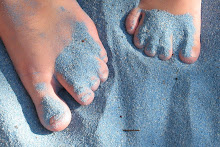This weekend, the family planned a little trip to the Houston Museum of Natural Science. The bad news: We discovered that the exhibit we want to see won't be here until October. The good news: We discovered it BEFORE we left the house.
So, what to do with the hours we'd planned to spend at the museum? We pulled a Weekend Martha and decided to make our own fall wreath. Here's a peek:
 One wooden wreath ring, three bunches of fake leaves, and several hundred stick pens later, WA-LAH -- something that passes as a real wreath. (The leaves on the trees around our house don't change color in the fall. That's why we have to use the fake ones.)
One wooden wreath ring, three bunches of fake leaves, and several hundred stick pens later, WA-LAH -- something that passes as a real wreath. (The leaves on the trees around our house don't change color in the fall. That's why we have to use the fake ones.)
Let's just hope that there aren't any sudden wind storms, or the neighbors might think they'd been dropped into a place that actually has a Fall . . .
So, what to do with the hours we'd planned to spend at the museum? We pulled a Weekend Martha and decided to make our own fall wreath. Here's a peek:
 One wooden wreath ring, three bunches of fake leaves, and several hundred stick pens later, WA-LAH -- something that passes as a real wreath. (The leaves on the trees around our house don't change color in the fall. That's why we have to use the fake ones.)
One wooden wreath ring, three bunches of fake leaves, and several hundred stick pens later, WA-LAH -- something that passes as a real wreath. (The leaves on the trees around our house don't change color in the fall. That's why we have to use the fake ones.)Let's just hope that there aren't any sudden wind storms, or the neighbors might think they'd been dropped into a place that actually has a Fall . . .
